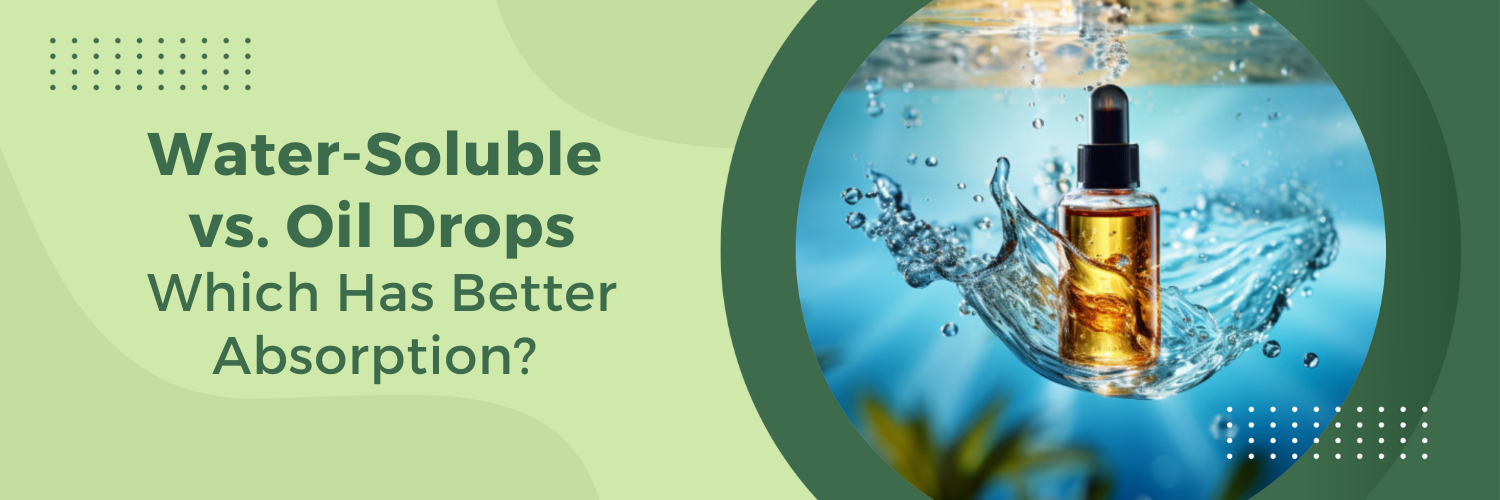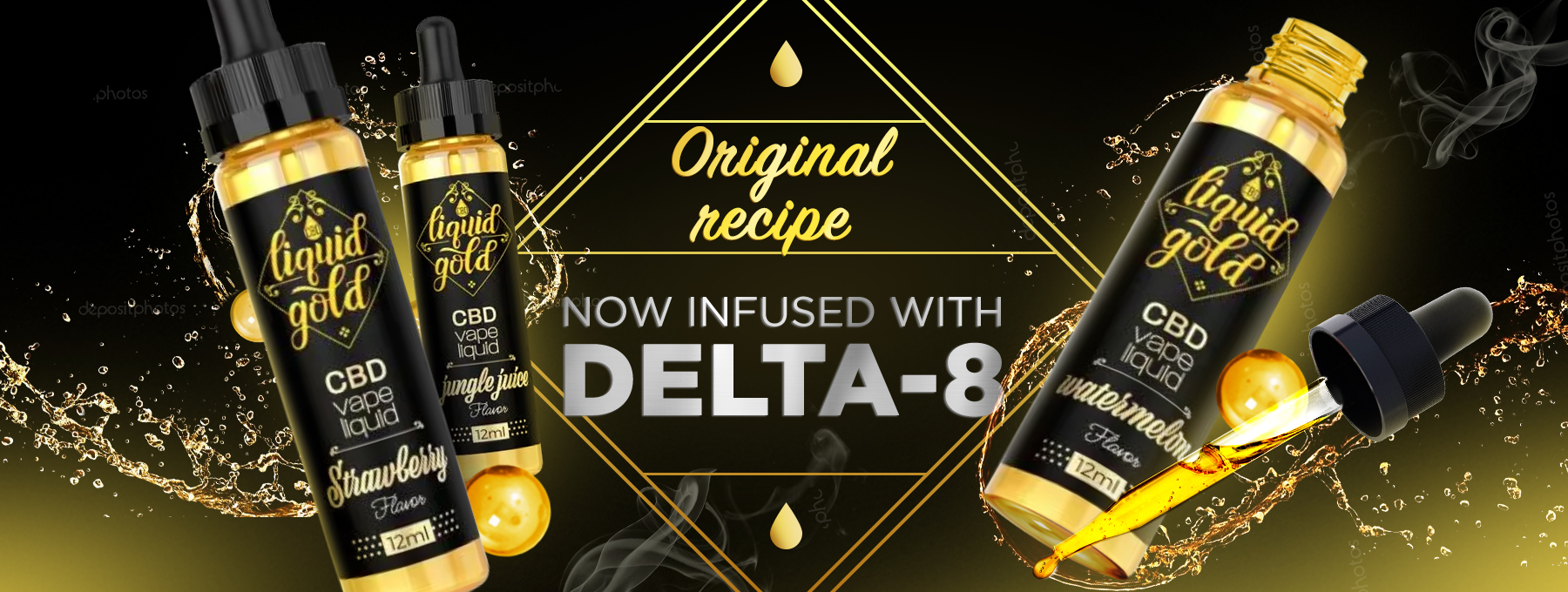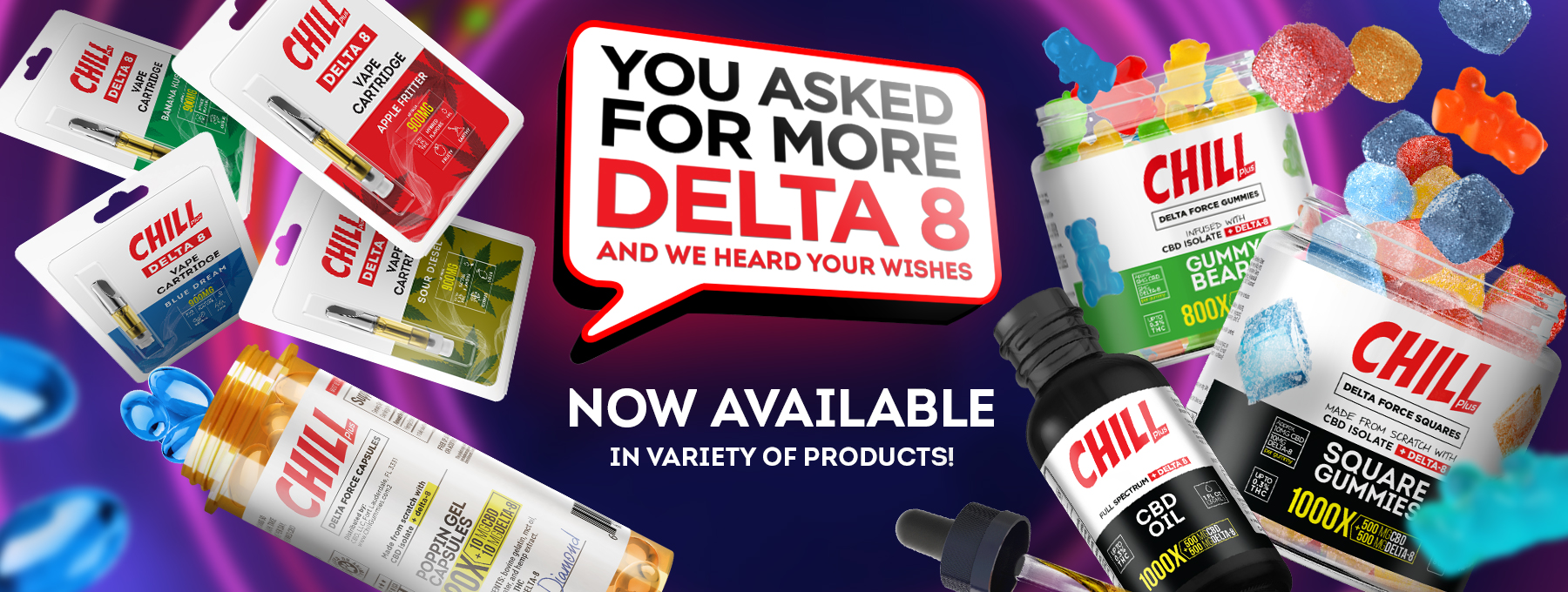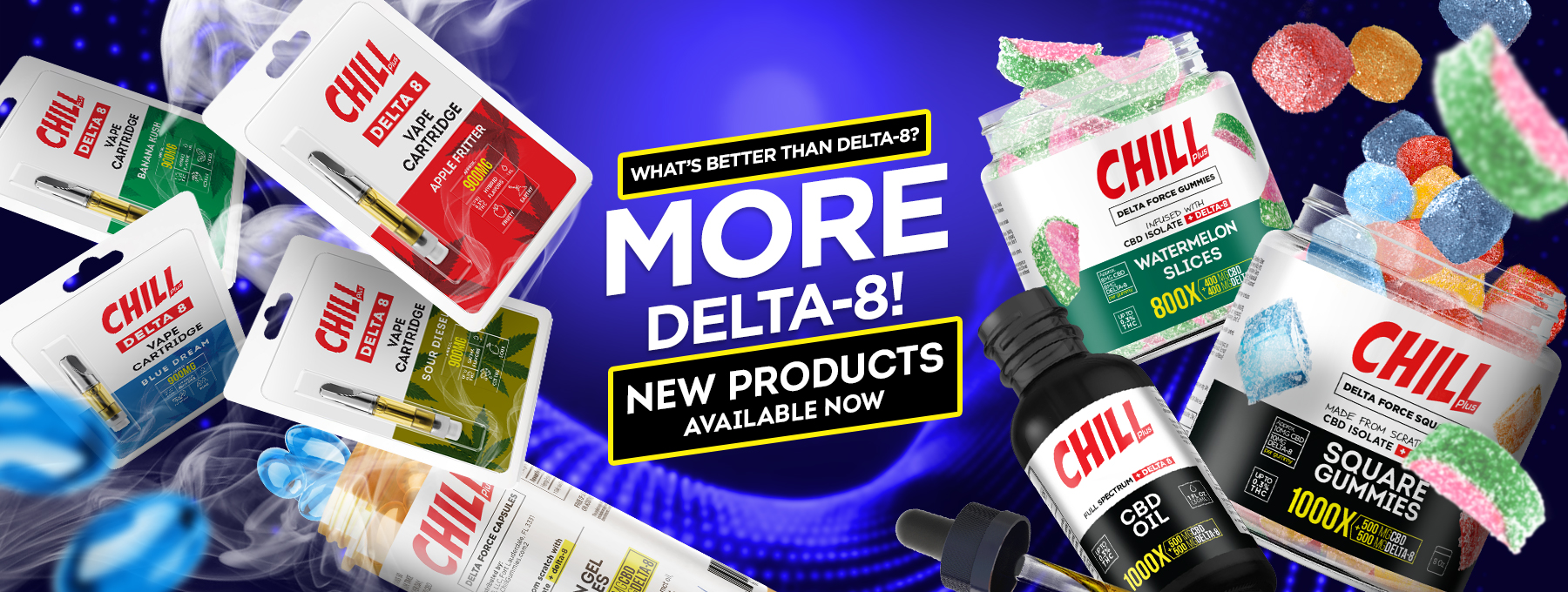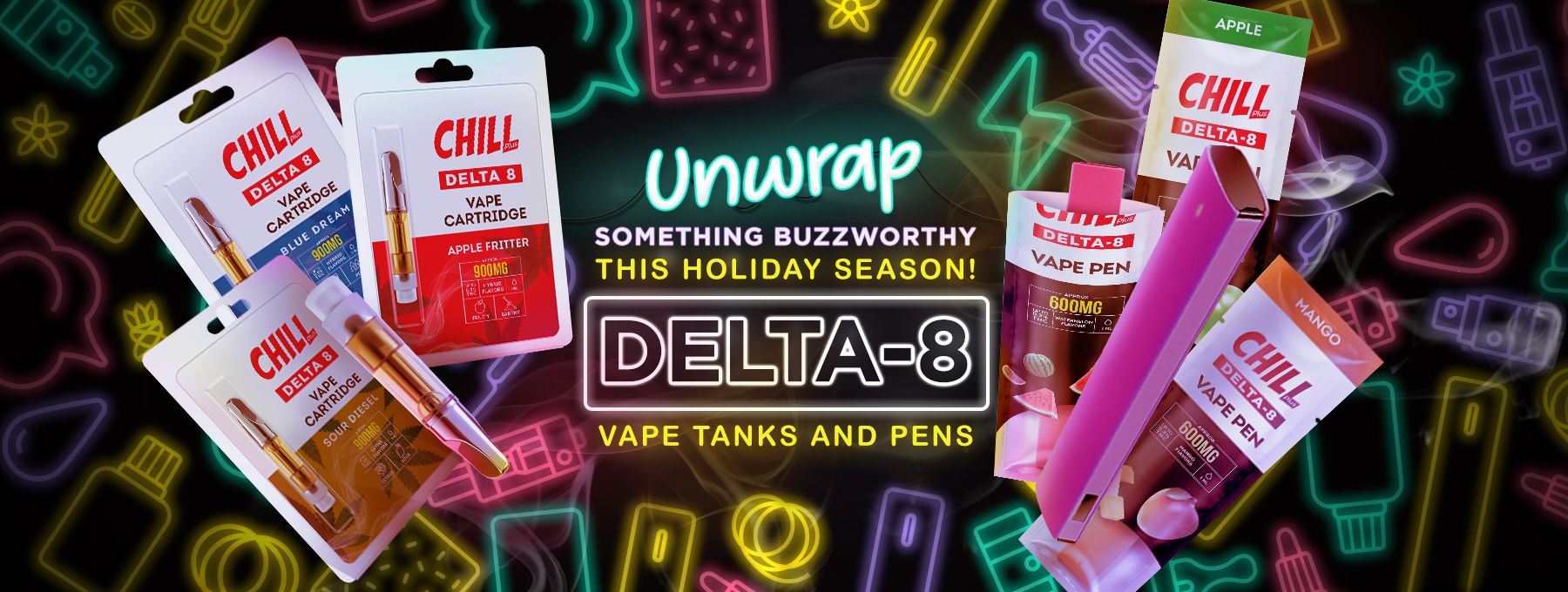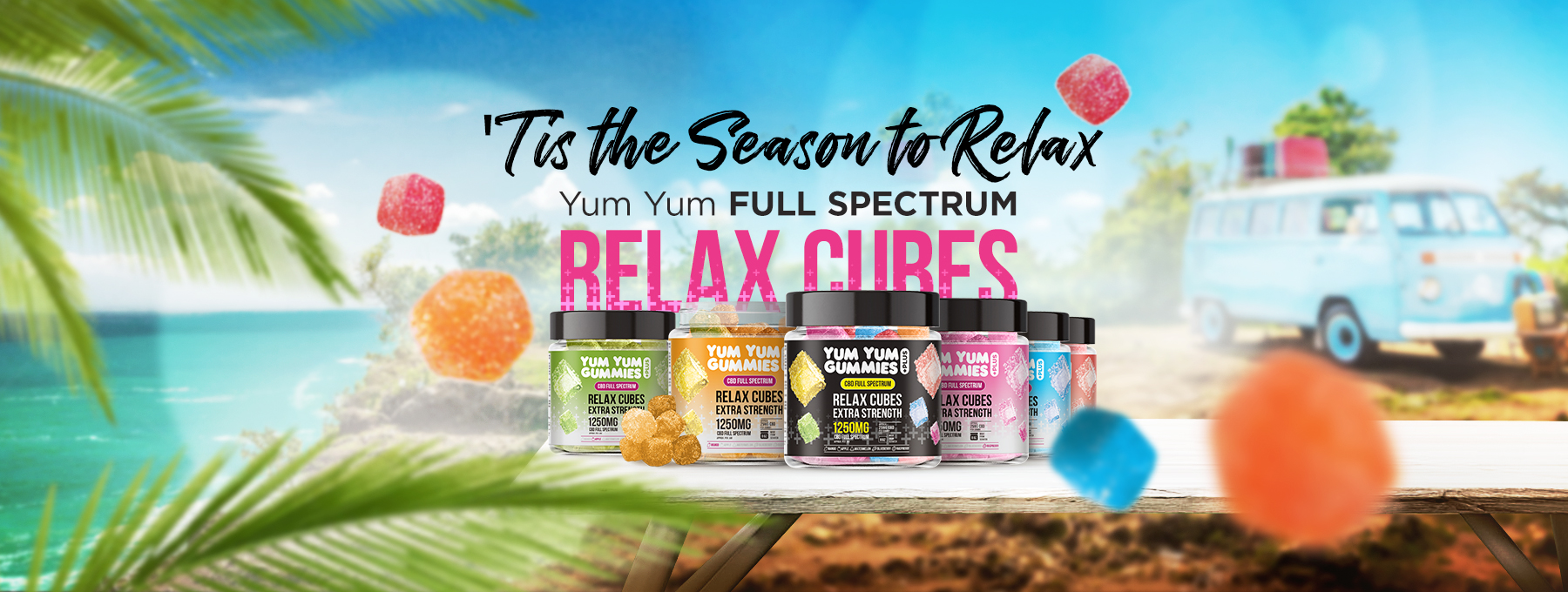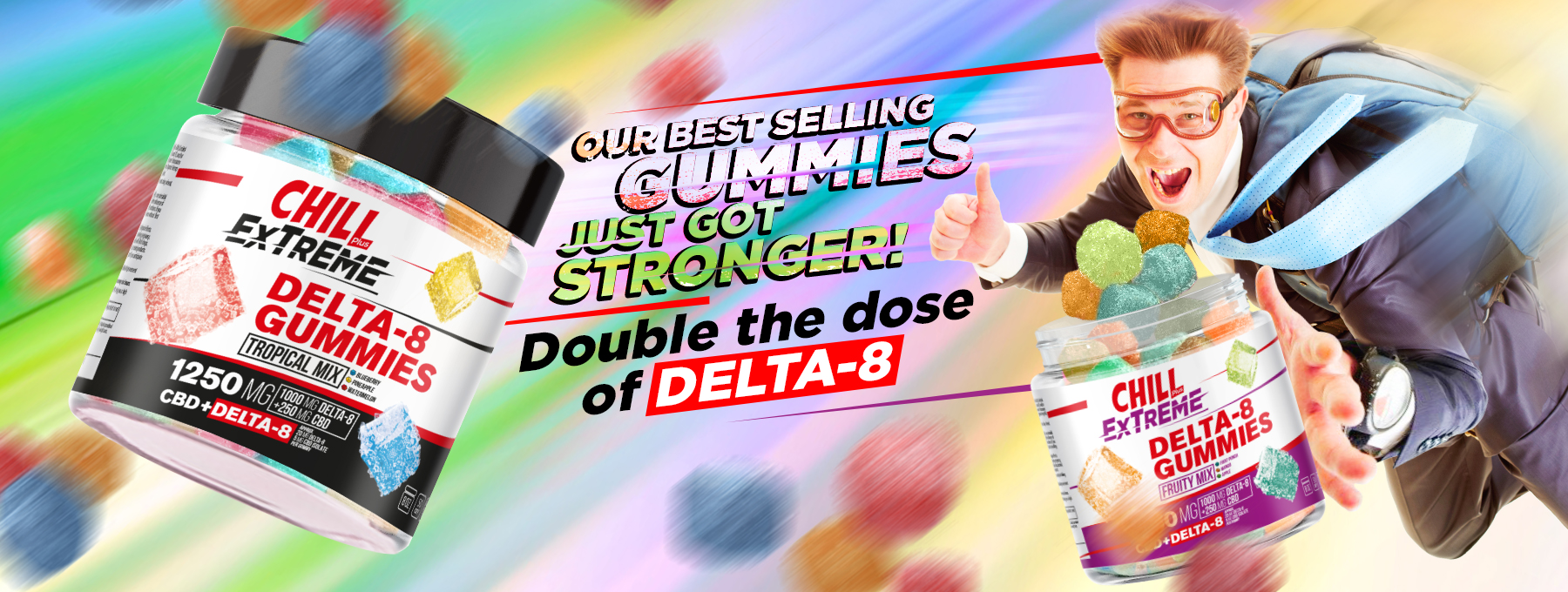2 Common Forms of CBD Consumption
CBD products have become increasingly popular in recent years due to their potential health benefits and natural properties. As consumers explore the world of CBD, understanding the concept of bioavailability and absorption becomes crucial. Bioavailability refers to the amount of CBD that enters the bloodstream and reaches its target receptors, determining the overall effectiveness of the product. In this blog, we aim to compare two common forms of CBD consumption: water-soluble CBD drops and traditional oil drops, with a particular focus on their absorption efficiency.

CBD Drops and Their Absorption
CBD drops, also known as tinctures, are a prevalent form of CBD product that comes with a dropper for precise dosing. These drops are designed for sublingual consumption, where users place the CBD oil under their tongue for quick absorption into the bloodstream. Additionally, CBD drops can be mixed with food or beverages for more convenient consumption.
The bioavailability of CBD is a crucial factor when it comes to experiencing its potential benefits. Bioavailability determines the percentage of CBD that enters the bloodstream and interacts with the endocannabinoid system, influencing the overall effects. When CBD is ingested, it undergoes the “first-pass effect” in the liver, where a significant portion of it is metabolized and may not reach the bloodstream. However, sublingual administration of CBD drops bypasses the liver, resulting in higher bioavailability and more substantial effects.
Several factors affect the absorption of CBD drops, including the delivery method and the product’s formulation. For example, the use of nanotechnology to create water-soluble CBD enhances the absorption rate compared to traditional oil drops. The type of carrier oil used in CBD tinctures can also impact absorption, as certain carrier oils may improve bioavailability.

Exploring Water-Soluble CBD Drops
Water-soluble CBD drops represent a relatively new and innovative form of CBD product. These drops are engineered using advanced nanotechnology, breaking down CBD particles into tiny, water-friendly molecules. As a result, water-soluble CBD offers better solubility in liquids, making it easily dispersible and more bioavailable than conventional oil drops.
The technology behind water-soluble CBD involves encapsulating CBD molecules in a lipid layer, allowing them to dissolve in water. This encapsulation protects the CBD from immediate metabolism in the digestive system, ensuring a higher percentage of CBD reaches the bloodstream and becomes available for use by the body’s receptors.
One significant advantage of water-soluble CBD drops is their rapid onset of action. Users may experience the effects more quickly than with traditional oil drops, making it a preferred option for those seeking immediate relief from various conditions. Furthermore, water-soluble CBD is known for its versatility, as it can be easily mixed with beverages or used in cooking without compromising its bioavailability.
To gain insights into consumer experiences, many users report that water-soluble CBD drops offer a more consistent and potent experience compared to traditional oil drops. The enhanced bioavailability leads to better utilization of CBD, potentially leading to increased benefits with smaller doses.

Analyzing Traditional CBD Oil Drops
Traditional CBD oil drops have been a staple in the CBD market for a long time. These drops are typically infused with a carrier oil, such as hemp seed oil or MCT oil, to facilitate administration and absorption. While widely used and familiar to consumers, traditional oil drops face certain challenges related to bioavailability.
When CBD is consumed in oil form, it must pass through the digestive system and undergo the “first-pass effect” in the liver. As a result, a significant amount of CBD is metabolized before it reaches the bloodstream, leading to lower bioavailability compared to water-soluble CBD drops.
Several studies and research have compared the bioavailability of traditional oil drops to water-soluble drops, showing that the latter offers better absorption and more efficient utilization of CBD. This discrepancy in bioavailability may impact the overall effectiveness of the product and the potential benefits experienced by the user.

|
Factors for Comparison |
Water-Soluble CBD Drops |
Traditional Oil Drops |
| Bioavailability | Higher bioavailability due to advanced nanotechnology and water-friendly molecules. | Lower bioavailability due to the “first-pass effect” in the liver. |
| Onset Time | Faster onset of action as they bypass the liver and are rapidly absorbed into the bloodstream. | Slower onset due to the “first-pass effect” and slower absorption. |
| Potency | Often available in higher concentrations, allowing for smaller doses to achieve desired effects. | Available in various potencies, may require larger doses for similar effects. |
| Taste and Flavor | Milder taste or flavorless, making it easier to mix with beverages or food. | Distinct hemp taste, which some users may prefer or dislike. |
| Versatility | Easily dispersible in liquids, can be mixed with beverages or used in cooking. | Can be mixed with food or beverages, but may not disperse as effectively. |
| Cost | Tends to be more expensive due to advanced technology and increased bioavailability. | Generally more affordable compared to water-soluble drops. |
| Personal Preference | Preferred by individuals seeking rapid effects and efficient absorption. | Preferred by those who prefer a familiar form of CBD consumption. |
Factors to Consider When Choosing Between Water-Soluble and Oil Drops

When deciding between water-soluble CBD drops and oil drops, there are several essential factors to consider. Each option has its unique characteristics and benefits, and understanding these factors can help you make an informed decision that aligns with your individual preferences and requirements. Here are the key factors to consider:
Bioavailability
Bioavailability refers to the amount of CBD that enters the bloodstream and becomes available for use by the body’s receptors. Water-soluble CBD drops have been engineered using advanced nanotechnology to enhance bioavailability, resulting in a higher percentage of CBD being absorbed compared to traditional oil drops. If efficient absorption and maximum benefits are essential to you, water-soluble drops may be the preferred choice.
Onset Time
The onset time refers to how quickly the effects of CBD are felt after consumption. Water-soluble CBD drops generally have a faster onset of action compared to traditional oil drops. This is because they bypass the liver’s “first-pass effect” and are more rapidly absorbed into the bloodstream. If you require immediate relief from symptoms, water-soluble drops may be more suitable.
Potency
Consider the desired potency of the CBD product. Water-soluble CBD drops often offer higher concentrations of CBD per milliliter, allowing for smaller doses to achieve the desired effect. On the other hand, traditional oil drops come in various potencies but may require larger doses to achieve the same effect as water-soluble drops.
Taste and Flavor
Taste is an important factor to consider, especially if you are sensitive to the natural earthy taste of hemp-derived CBD. Water-soluble CBD drops tend to have a milder taste or are flavorless, making them easier to incorporate into beverages or food. Traditional oil drops may have a distinct hemp taste, which some users find preferable or undesirable.
Versatility
Water-soluble CBD drops offer greater versatility due to their ability to dissolve in water. They can be easily mixed with beverages or used in cooking without compromising their bioavailability. Traditional oil drops can also be mixed with food or beverages, but they may not disperse as effectively as water-soluble drops.
Cost
Consider your budget and the cost of the CBD product. Water-soluble CBD drops, with their advanced technology and increased bioavailability, may be more expensive than traditional oil drops. However, it’s essential to find a balance between affordability and the desired level of absorption.
Personal Preference
Ultimately, your personal preference plays a significant role in the decision-making process. Some individuals may prefer the convenience and rapid effects of water-soluble drops, while others may find traditional oil drops to be more familiar and suitable for their needs.
Consult with a Healthcare Professional
If you are unsure about which type of CBD drop is best for you, consider consulting with a healthcare professional or a knowledgeable CBD expert. They can provide personalized guidance based on your health condition, goals, and lifestyle.
Which Has Better Absoption?

Water-soluble CBD drops generally have better absorption compared to traditional oil drops. This is primarily due to the advanced nanotechnology used in the creation of water-soluble drops, which allows CBD molecules to be broken down into tiny, water-friendly particles. As a result, water-soluble CBD is more easily absorbed into the bloodstream.
Traditional oil drops, on the other hand, must pass through the digestive system and undergo the “first-pass effect” in the liver. During this process, a significant portion of the CBD is metabolized and may not reach the bloodstream, resulting in lower bioavailability and absorption efficiency.
The enhanced absorption of water-soluble CBD drops translates to several advantages for consumers. It allows for a higher percentage of CBD to reach the body’s receptors, leading to more significant effects and potential benefits. Additionally, water-soluble drops offer a faster onset of action, providing quicker relief for those seeking immediate results.
While both water-soluble and oil drops can be effective in delivering CBD’s potential benefits, the higher bioavailability and improved absorption of water-soluble CBD drops make them a preferred choice for many individuals seeking a more efficient and potent CBD consumption method. However, it’s essential to consider individual preferences and needs when choosing between the two options. Consulting with a healthcare professional or CBD expert can also provide valuable insights to make an informed decision.
Conclusion

The absorption efficiency of CBD drops significantly impacts the overall effectiveness of the product. Water-soluble CBD drops offer superior bioavailability compared to traditional oil drops due to their innovative nanotechnology and ability to dissolve in water. This enhanced absorption translates to faster onset, increased potency, and potentially greater benefits with smaller doses.
Ultimately, the choice between water-soluble and oil drops depends on individual preferences and needs. For those seeking immediate relief and efficient absorption, water-soluble CBD drops may be the ideal option. However, traditional oil drops still have their place in the market and can be sufficient for those who do not prioritize rapid onset. It is essential for readers to consider their specific requirements and consult with healthcare professionals if necessary before making an informed decision about which type of CBD drop is best suited for their needs.
If you’re interested in exploring high-quality CBD products with superior absorption efficiency, we invite you to check out the range of offerings from Leaf Alleviate. Visit www.leafalleviate.com to learn more about their innovative products and how they can enhance your wellness journey.
FAQs
Q: What is the difference between water-soluble CBD drops and oil drops?
Water-soluble CBD drops are engineered using advanced nanotechnology to create tiny, water-friendly CBD molecules that offer better bioavailability and rapid onset of action. Traditional oil drops are infused with a carrier oil and undergo the “first-pass effect” in the liver, resulting in lower bioavailability compared to water-soluble drops.
Q: How does bioavailability affect the effectiveness of CBD?
Bioavailability determines the amount of CBD that enters the bloodstream and interacts with the endocannabinoid system. Higher bioavailability results in more CBD reaching the target receptors, leading to increased effectiveness and potential benefits.
Q: Are water-soluble CBD drops more expensive than oil drops?
Due to their advanced technology and increased bioavailability, water-soluble CBD drops may be more expensive than traditional oil drops.
Q: Can I mix water-soluble CBD drops with beverages?
Yes, water-soluble CBD drops are easily dispersible in liquids and can be mixed with beverages for convenient consumption.
Q: How long does it take for water-soluble CBD drops to take effect compared to oil drops?
Water-soluble CBD drops generally have a faster onset of action compared to traditional oil drops, as they are more rapidly absorbed into the bloodstream.

